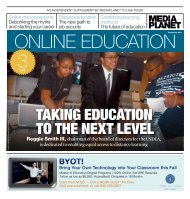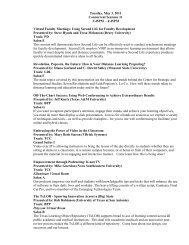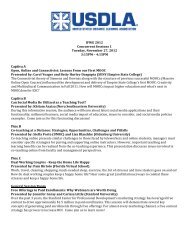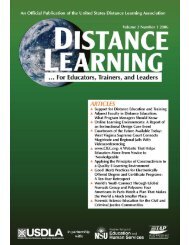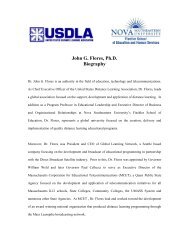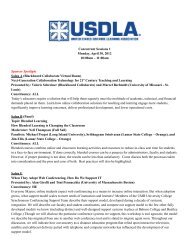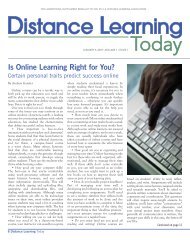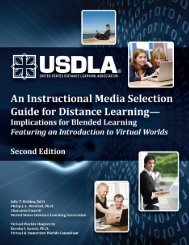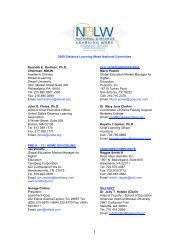United States Distance Learning Association
United States Distance Learning Association
United States Distance Learning Association
- No tags were found...
You also want an ePaper? Increase the reach of your titles
YUMPU automatically turns print PDFs into web optimized ePapers that Google loves.
cation and give indications of where the<br />
field is headed.<br />
QUESTION: Is it fair to state that distance<br />
education on a graduate level in its current<br />
state is the true equivalent of a classroom experience<br />
with regard to content and instructional<br />
design<br />
Yes and No. It depends on how you<br />
define “graduate level education.” Based<br />
on research and prior experience, I believe<br />
quite firmly that there is a qualitative difference<br />
between the distance learning and<br />
the face-to-face experience. Effective distance<br />
[instruction] is a different experience<br />
than effective face-to-face instruction. It<br />
challenges learners in different ways, and<br />
develops different types of skills. Therefore,<br />
as long as we do not use traditional<br />
face-to-face instruction’s metaphor as the<br />
basis for comparison with other instructional<br />
approaches, I believe distance learning<br />
graduate education can be as effective<br />
as face-to-face graduate education (quality<br />
of teaching and instructional design<br />
remains the key determinant of quality in<br />
both instructional approaches). However,<br />
if our measuring stick is traditional face-toface<br />
education, and “equivalence” is based<br />
on how closely distance learning mirrors<br />
face-to-face instruction, then it would be<br />
hard to argue that the two are truly equivalent.<br />
QUESTION: There seems to be a mad dash<br />
by universities to develop new online offerings.<br />
How can we be assured of a reasonable level of<br />
quality and accountability in these educational<br />
products<br />
Great question! People differ in their<br />
views on this issue. Some argue that market<br />
forces will ensure that the highest quality<br />
programs will be the most successful<br />
ones, and therefore that there is a built-in<br />
incentive for quality and accountability. I<br />
am skeptical about this. While I have high<br />
confidence in the potential of online distance<br />
learning, I believe that many universities<br />
are propagating online learning with<br />
more focus on increasing enrollment than<br />
on improving quality of instruction. A couple<br />
of ways to improve quality and<br />
accountability:<br />
1. Requiring faculty to experience distance<br />
learning as learners before teaching<br />
online. Many faculty are clueless<br />
about the online experience since it did<br />
not figure in their own education.<br />
2. Evaluating distance learning courses<br />
on the basis of relevant attributes for<br />
distance learning. Many universities<br />
use the same criteria for student course<br />
evaluation in distance learning and in<br />
fact to face instruction. This seems<br />
inappropriate to me, and leaves little<br />
relevant insight into the true quality of<br />
online instruction. Dropout rates, student<br />
perception of isolation, and so on<br />
need to figure prominently when the<br />
effectiveness of distance learning is<br />
evaluated.<br />
3. Requiring faculty/departments to gain<br />
approval for distance learning courses<br />
in the same way that they are required<br />
to get approval for new course offerings.<br />
If a department in a university<br />
wants to offer a new course, they have<br />
to submit a proposed syllabus and so<br />
on for the class in order to get<br />
approval. I believe that it would help if<br />
departments were required to provide<br />
proposals for courses when they are<br />
switched from face-to-face to distance<br />
learning delivery. As part of this process,<br />
departments could be required to<br />
answer questions about Carnegie unit<br />
equivalence between the distance<br />
learning and face-to-face versions of<br />
the course, how (and how often) students<br />
will have access to faculty, etc.<br />
Often it seems courses are being converted<br />
to an online format in a very<br />
haphazard manner, and the quality of<br />
the course suffers immensely.<br />
80 <strong>Distance</strong> <strong>Learning</strong> Volume 4, Issue 4



